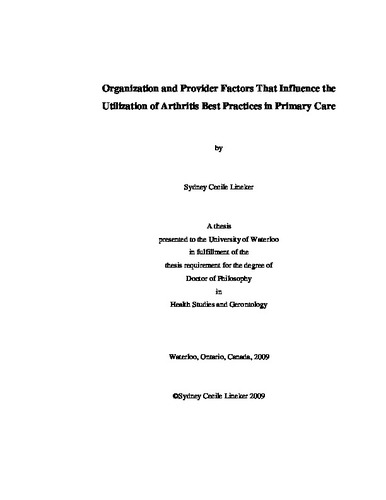| dc.description.abstract | Background: Most treatment for people with arthritis occurs at the primary care level yet many studies have documented the need for improved arthritis management in this environment. The dissemination of clinical practice guidelines (CPGs) has been suggested as one method for improving care delivery. Getting a Grip on Arthritis, a theory and evidence-based educational program was developed to disseminate arthritis best practices based on published CPGs for the management of osteoarthritis (OA) and rheumatoid arthritis (RA). Primary care organizations were invited to enroll providers in an inter-professional workshop. Six months of reinforcement activities were offered following the workshop to support the delivery of arthritis care in their communities.
Purpose: This study was designed to determine which organizational and individual level characteristics contributed to improved provider use of arthritis best practices six months following the workshops.
Methods: The ACREU Primary Care Survey was completed by workshop participants at baseline and six months following the workshops in order to evaluate their use of arthritis best practices. This survey measured providers’ responses to open-ended questions that asked how they would manage the individual patients described in three hypothetical case scenarios. One point was given for each recorded best practice and totaled for each case scenario, with the highest possible score being eight for the late RA case and moderate knee OA case, and seven for the early RA case. Requests for reinforcement activities were tracked by study staff during the six months following the workshops. A practice profile was also completed by each organization.
Analysis: Two models of knowledge utilization (KU) were constructed for testing. For Model 1, two-level hierarchical linear modeling (HLM) was used to determine the direct effects of provider and organizational level variables on intended use of arthritis best practices six months post-workshops, while controlling for clustering within organizations. In model 2, logistic regression was used to determine the influence of organization level factors on one specific best practice, that is, dissemination of patient educational materials during the six months following the workshop.
Results: 275 providers from 131 organizations completed both baseline and six month follow-up surveys. For Model 1, total best practice scores for all three case scenarios were predicted by the discipline of the provider, the model of care in which they worked and baseline best practice scores (P<0.05). Controlling for these variables, baseline confidence in managing arthritis also predicted the six month follow-up scores for moderate knee OA (P=0.05) and baseline satisfaction with ability to manage arthritis predicted the follow-up scores for late RA (P=0.04). For Model 2, the estimated probability of disseminating patient educational materials was >82% for community health centres, primary care networks and regionally funded models of care compared to 30% for the federally funded model of care (P<0.01), and was 88% for organizations that sent multidisciplinary team members to the workshops, compared to 70% for those that did not send such a team (P=0.07).
Conclusions: Use of arthritis best practices may be influenced by provider characteristics (discipline, satisfaction and confidence in managing arthritis), the model of care in which they work and the team learning experience. These results have implications for the training and education of health professionals and the design of models of care to enhance arthritis care delivery. | en |

